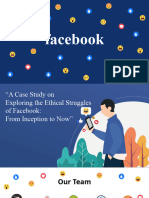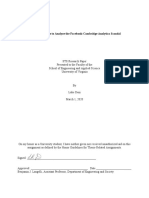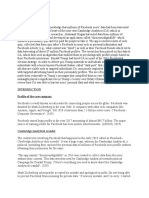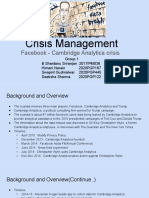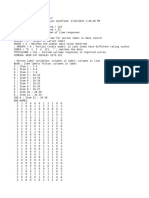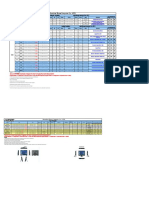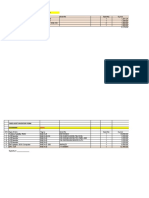HACKTIVISM AND THE FACEBOOK DATA
LEAK
Introduction
Hacktivism, a blend of hacking and activism, is a powerful tool in the digital world where
individuals or groups use cyber means to protest or advocate for a cause, often related to
politics, human rights, or environmental issues. Hacktivists typically engage in cyber-attacks,
defacing websites, leaking sensitive data, or disrupting services, all to make a political
statement or highlight social issues.
Facebook, now Meta Platforms, Inc., has long been under scrutiny due to its data collection
practices, handling of privacy concerns, and its role in amplifying misinformation.
Hacktivism has often targeted Facebook as a symbol of corporate greed and a violation of
privacy. The 2021 Facebook data leak, which exposed the personal information of over 530
million users, is a prime example of how hacktivism and data leaks intersect. While hackers
may have been directly responsible for exploiting vulnerabilities, hacktivists used the leak as
an opportunity to make political statements and advocate for reform. This case study explores
how hacktivism played a significant role in amplifying the political message behind this data
breach, examining the social, ethical, and political implications.
Background of the Facebook Data Leak
In April 2021, a massive leak exposed personal data from over 530 million Facebook users.
This data included sensitive information such as phone numbers, full names, birthdates, email
addresses, locations, and user bios. The breach was attributed to a vulnerability that Facebook
had failed to fix, allowing hackers to scrape publicly available data from users’ profiles.
While the leak did not involve financial information or more sensitive data such as
passwords, it raised significant concerns about the platform’s security practices and its ability
to protect user privacy.
This data breach was discovered months after the vulnerability had been exploited, and
although Facebook stated that the vulnerability had been patched in 2019, the consequences
were far-reaching. The leaked data became publicly available on underground forums and
data repositories, giving rise to concerns about identity theft, fraud, and the weaponization of
personal data for cyber-attacks.
However, beyond the technical aspects of the breach, the Facebook data leak served as a
battleground for hacktivism. Hacktivists saw this as an opportunity to highlight Facebook’s
role in data exploitation and push for reforms in digital privacy and security.
The Role of Hacktivism in the Facebook Data Leak
Hacktivism often involves using data breaches or cyber-attacks as a tool to make a political
or social statement. In the case of Facebook, hacktivist involvement in the data leak can be
seen as part of a broader campaign to challenge corporate control over personal data and to
call attention to unethical practices such as surveillance capitalism, user manipulation, and
privacy violations.
VK-39051
�1. Hacktivism and the Fight Against Surveillance Capitalism
One of the core criticisms leveled at Facebook and other social media platforms is their
reliance on surveillance capitalism. This term, coined by academic Shoshana Zuboff, refers
to the practice of collecting and monetizing vast amounts of personal data from users.
Hacktivists, privacy advocates, and digital rights organizations argue that Facebook’s
business model is built on exploiting its users by selling their personal information to
advertisers, making users the product rather than the consumer.
The 2021 data leak, in which over half a billion users' information was exposed, exemplified
the dangers of surveillance capitalism. Hacktivists saw this as a moment to attack Facebook’s
business model and demand greater accountability. They used the leak as a demonstration of
how Facebook’s data collection practices were not only ethically questionable but also
technically insecure.
Hacktivist groups, such as Anonymous, which has long used digital activism to criticize the
power of large corporations, seized on this moment to rally users to demand transparency in
how their data is used. They argued that Facebook's ability to harvest user data and store it in
insecure environments posed a direct threat to personal privacy, especially given the vast
quantity of sensitive information the platform holds. Hacktivist campaigns around the breach
thus helped raise awareness about the concept of surveillance capitalism and its implications
for individual autonomy.
2. Digital Protest and the Exposure of Facebook’s Security Failures
The 2021 Facebook data leak gave hacktivists a chance to directly protest Facebook’s lack of
data protection. While the company maintained that it had patched the vulnerability years
earlier, critics pointed out that Facebook’s failure to prevent the breach demonstrated a gross
negligence regarding user privacy. Hacktivists amplified this message by making the leak
more widely known, circulating the leaked data, and drawing media attention to the issue.
These hacktivists saw the breach as more than just a security failure—it became a symbol of
corporate negligence. They pushed for more stringent oversight of tech companies that
handle personal data, demanding that Facebook take stronger steps to protect user
information and be more transparent about its data collection practices.
By focusing on the vulnerability that allowed the breach to happen, hacktivists highlighted
Facebook's irresponsible handling of user data and its lack of accountability in securing
private information. This digital protest called for systemic changes and emphasized that
platforms like Facebook should not be allowed to operate without external oversight.
3. Calls for Digital Privacy Reforms
The hacktivist response to the Facebook data breach was a direct push for legislative reform.
Hacktivists, along with privacy advocates and digital rights organizations, used the leak as a
rallying cry for stronger privacy protections, both within Facebook and across the broader
tech industry.
European Union's GDPR: The General Data Protection Regulation (GDPR)
introduced in 2018 by the European Union was one of the key legislative responses to
VK-39051
� growing concerns about digital privacy. Hacktivists argued that laws like the GDPR
should be adopted globally and enforced more rigorously to prevent future breaches.
GDPR holds companies accountable for their treatment of user data, giving
individuals greater control over how their personal information is collected and used.
Data Protection in the U.S.: In the U.S., advocates for digital privacy, alongside
hacktivist groups, pushed for stronger federal regulations on data protection. They
argued that companies like Facebook, with access to vast troves of personal
information, should be held to higher standards of security and transparency. The data
leak showed that existing laws were insufficient to protect users' personal data from
misuse.
Hacktivists used the Facebook breach to mobilize the public and politicians to demand these
reforms, highlighting the platform's vulnerabilities as evidence of the need for stronger
protections and corporate responsibility.
Ethical Implications and Controversy
While the Facebook data leak provided an opportunity for hacktivists to push for reform and
draw attention to issues like surveillance capitalism and digital privacy, it also raised
important ethical questions.
1. The Ethics of Data Leaks
From an ethical perspective, some argue that leaking personal data for political purposes is
problematic. Even though the hacktivist goals were to expose Facebook’s ethical failures, the
leak of personal data can lead to identity theft, fraud, and the weaponization of personal
information. Some privacy advocates argue that exposing user data—even with the best of
intentions—can do more harm than good, especially when it puts individuals at risk.
For example, the leaked data could be used for phishing attacks, spam, or more severe types
of cybercrimes. Hacktivists need to balance their objectives of raising awareness with the
potential consequences of exposing sensitive personal information. In this sense, the ethics of
hacktivism—especially in the context of data leaks—remains a complex and contested issue.
2. The Fine Line Between Activism and Cybercrime
Hacktivism operates in a legal gray area. While its intent may be political, it often involves
actions that are technically illegal, such as unauthorized access to data or systems. Hacktivists
argue that the ends justify the means, but critics contend that breaking the law—even in
pursuit of a noble cause—can be counterproductive and undermine the legitimacy of the
movement.
Hacktivists targeting Facebook’s security protocols to expose vulnerabilities must weigh the
risks of their actions. While the exposure of Facebook’s failings may spur change, it could
also provoke backlash from law enforcement or tech companies, leading to tougher
regulations or greater surveillance of online activities.
Social and Political Impact of the Leak
VK-39051
�The hacktivist-driven media campaigns surrounding the Facebook data breach had significant
political and social effects:
Raising Public Awareness: Hacktivists and privacy advocates used the leak to raise
public awareness about the dangers of digital surveillance and the exploitation of
personal data by tech companies. By amplifying discussions about privacy and data
protection, the hacktivists helped to foster a more informed public that is more
conscious of how their data is used online.
Corporate Accountability: The leak and subsequent protests forced Facebook to
respond, albeit slowly. The hacktivists' advocacy put pressure on Facebook to adopt
stronger security measures, revise its data privacy policies, and be more transparent
about how it handles user data. The fallout from the breach led to greater calls for
corporate accountability within the tech industry.
Legislative Changes: In the wake of the leak, hacktivist movements, digital rights
organizations, and privacy advocates lobbied for changes to data protection laws
globally. The breach served as a catalyst for increased scrutiny of social media
platforms, reinforcing the need for more robust digital privacy laws and better
oversight of tech giants like Facebook.
Conclusion
The Facebook data leak of 2021 was a significant event in
the ongoing battle for digital privacy and corporate accountability. Hacktivists played a
crucial role in amplifying the message of the breach, using it as a vehicle to push for changes
in the way companies handle personal data. While the ethics of using data leaks for protest
remains controversial, hacktivists have successfully highlighted the need for reform in the
tech industry and the importance of safeguarding privacy in the digital age.
The case of the Facebook data leak illustrates how hacktivism can be a double-edged sword,
revealing the complexities of digital activism in the modern era. While the hacktivists
involved in the Facebook breach may have had noble intentions, their actions underscore the
challenges in balancing privacy rights, corporate accountability, and the ethical use of digital
tools. The breach served as a wake-up call for governments, corporations, and individuals to
rethink their relationship with personal data in an increasingly interconnected world.
VK-39051














